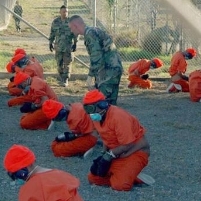Difficult Truths about Guantánamo
Tuesday, March 24, 2009

Writing for The Washington Note, Lawrence B. Wilkerson, who was Colin Powell’s chief of staff while Powell was Secretary of State, has laid out seven aspects of the Guantánamo debate that have been largely kept out of the media and thus out of the living rooms of most Americans:
1. Ineffective and incompetent vetting of Afghan battlefields
No meaningful attempt was made to properly decide who was being transported to Cuba for detention and interrogation, even though some of the detainees were clearly innocent Afghanis turned in by bounty hunters. This was mostly due to a lack of sufficiently trained troops and civilians, as well an utter disregard for law. There was also great pressure from Secretary of Defense Donald Rumsfeld and others to “just get the bastards to the interrogators.”
2. Several U.S. officials and leaders knew of the poor and ineffective vetting
U.S. leaders, including some in the military, became aware early on that, due to poor vetting, many of the detainees were innocent, had little-to-no intelligence value, and should be released immediately. However, still stung by their failure to prevent the 9/11 attacks, they were afraid that admitting another error would taint their leadership during the “war on terror,” and so they chose not to admit that they had blundered again.
3. Colin Powell and Richard Armitage attempted to improve the Guantánamo situation
Secretary of State Colin Powell and his deputy, Richard Armitage, urged Ambassador Pierre Prosper, the U.S. envoy for war crimes issues, to repatriate every detainee who could be repatriated, including a 13-year-old boy and a man over the age of 90. However, Rumsfeld and Vice-President Cheney successfully resisted Prosper’s pleas.
4. It was irrelevant if a detainee was innocent, as long as he lived in Afghanistan
The Bush administration determined that it did not matter whether a detainee was innocent or not. As long as he was captured on or near the battle area, he might have some piece of information which, if run through a computer, might somehow prove helpful. Since even the innocent detainees were Muslim peasants, their rights as individuals were inconsequential. This disastrous plan, dubbed the “mosaic philosophy,” was later used in Iraq as well, leading to the Abu Ghraib abuses.
5. The incompetent cataloguing and maintenance of detainees and evidence
There was virtually no proper handling of evidence, no chain of custody, and no attention to the details required for any eventual legal proceedings, even for those two dozen or so detainees who really were hardcore terrorists.
6. Less than a dozen Guantánamo detainees provided useful intelligence
Despite the use of torture and harsh interrogations, only a handful of ring leaders and their companions provided any information that might be useful in fighting terrorism.
7. The assumption that closing down Guantánamo would be lengthy and complex
This assumption is mostly a political argument put forward and endorsed by Republicans, such as Cheney. The current Democratic administration has maintained this position for fear of showing signs of vulnerability on any national security issue. However, there is no physical reason why the facilities cannot be shutdown safely and swiftly.
-Aaron Wallechinsky
Guest Post by Lawrence Wilkerson: Some Truths About Guantanamo Bay (by Lawrence Wilkerson, Washington Note)
- Top Stories
- Unusual News
- Where is the Money Going?
- Controversies
- U.S. and the World
- Appointments and Resignations
- Latest News
- Trump Offers to Return Alaska to Russia
- Musk and Trump Fire Members of Congress
- Trump Calls for Violent Street Demonstrations Against Himself
- Trump Changes Name of Republican Party
- The 2024 Election By the Numbers






Comments